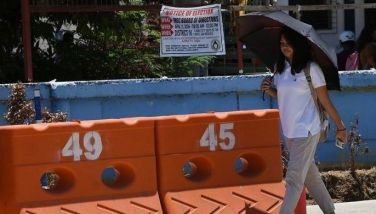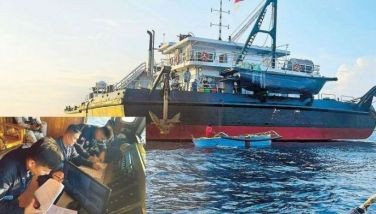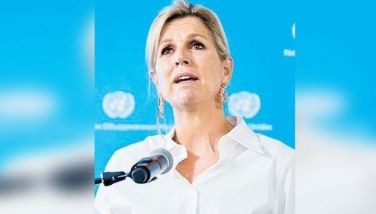Anti-Money Laundering LAW: Tax evaders, other offenders off the hook for now
October 6, 2001 | 12:00am
(Conclusion) |
BSP Gov. Rafael Buenaventura, however, lobbied against this and convinced Senate leaders to instead include the SEC commissioner and the Insurance Commission head in the three-man task force overseeing the AMLC. Aside from anticipating the load of work, Buenaventura said the BSP only has jurisdiction over banks and financial institutions. It could not supervise entities outside of the banking system.
Sen. Joker Arroyo criticized the BSP for "overloading the draft bill with unnecessary provisions that are very controversial." He cited the "enormous quasi-judicial powers" vested in the proposed AMLC which may be challenged as "unconstitutional".
"How can a bank make a determination of whether the money is clean or not? A bank is a mere depository, not a judge… We are making the Council very powerful by giving it an authority to freeze the account," he argued.
Arroyo’s position on the anti-money laundering bill surprised some government officials. The former Makati congressman was a prosecutor in Estrada’s botched impeachment trial yet he was also pushing for provisions that would make the anti-money laundering law almost toothless. These included the right of the suspected money launderer to sue the AMLC "to seek redress," and shifting the burden of proof to the plaintiff (the government unit filing the anti-money laundering case) from the accused.
During the floor deliberations on Sept. 27, Arroyo also pushed for the adoption of the House version on obtaining a court order to peek into bank deposits, even if, as a prosecutor in Estrada’s impeachment, he was railing against banks disobeying the order from the impeachment court to pry open the former president’s bank accounts.
To Arroyo, the problem was the BSP. "In the impeachment trial, he (BSP governor) didn’t cooperate with us… They didn’t help us one bit. We discovered all (the accounts) on our own. This shows the BSP is not immune to political pressure… That’s why this bill is dangerous. Gloria might utilize it to go after the opposition," he said in an interview.
He also said his "prejudice" against the BSP is "institutional, not against the governors." He said he will oppose any move to give the BSP more teeth than it currently has because "I just cannot trust them as truly independent."
While the law only gave the AMLC the authority to freeze the suspicious account for 15 days, there were attempts to erode this power even further. Sen. Panfilo Lacson, who himself is being linked by intelligence chief Victor Corpus to money laundering, proposed an amendment that would give the owner of the suspicious account three days to explain before the deposits could be frozen. Sen. Edgardo Angara endorsed the amendment for style because it was "concise."
When Senate President Franklin Drilon banged the gavel approving the Lacson amendment, Buenaventura and Finance Secretary Jose Isidro Camacho, who were seated at the Senate gallery watching the proceedings, suddenly sprang from their seats and talked to Osmeña. Convinced that the amendment will erode the powers of the AMLC and enable the suspected money launderer to buy time to conceal the money, Osmeña rose to the floor and sought for a reconsideration of the Senate move.
In the final version that was ratified, the suspected money launderer has 72 hours or three days to explain why the freeze order should be lifted. The depositor would be notified that his account has been frozen "simultaneously" with the release of the freeze order. While the provision relaxes the bank secrecy rule, it added a bureaucratic layer that would delay the opening of suspicious deposits.
Sen. Aquilino Pimentel, Jr. also proposed to lessen the penalty and jail terms for convicted money launderers. He said the imprisonment term of seven to 14 years under the proposed bill is "a draconian approach" and should be shortened to one to five years. The senator, however, failed to push strongly for the move.
Congress made sure it will exert influence over the anti-money laundering body by inserting a provision giving itself oversight powers on the drafting of the implementing rules and regulations of the law.
The truth is that, were it not for the threats from the FATF, Philippine officials would not have mustered the political will to pass an anti-money laundering law. Three administrations – under former Presidents Corazon Aquino, Fidel Ramos and Joseph Estrada – failed to fulfill the country’s international commitment to criminalize and combat money laundering.
Thus, on March 12, 2000, the US State Department issued a scathing report citing the Philippines as one of six Asian countries being used as money laundering centers. The report rated the Philippines "a concern," with because of rising crime, pervasive corruption and the absence of anti-money laundering laws.
The report came just three months ahead of the FATF announcement listing the Philippines among 15 countries and territories not doing enough to fend off the flow of dirty money. Then in early August 2000, the US abstained from voting for the approval of a $1.4-billion International Monetary Fund facility for the Philippines. The US, which entered the lone abstention, reportedly raised doubts the Estrada administration was sincere and serious in curbing money laundering.
At a luncheon at the White House the same month, then US President Bill Clinton also followed up on the Philippines’ international commitment from then President Estrada who was there on a state visit. A Philippine senator who was in the meeting said Treasury Secretary Lawrence Summers also pressed Buenaventura and then Finance Secretary Jose Pardo, "and gave them a mouthful."
Despite the opposition, the bill relaxing the deposit secrecy law was miraculously approved on second reading at the House of Representatives on Dec. 7, 2000. This was amid raging controversy during the impeachment trial of Estrada, linking banks used as depositories of the president’s alleged illegal funds. Barely a week later, however, the House suddenly recalled the bill due to a technicality. "Clean copies" of the bill were not distributed before its approval, reportedly a violation of the House rules.
The measure thus went back to second reading and never saw the light of day. Dust started to accumulate when Congress had a Christmas break last year, and thickened when Estrada was ousted on Jan. 20.
In April, the Arroyo administration called for a special session of Congress to pass one of the two pending bills: the power reform bill. A top government official who attended the first Legislative-Executive Development Advisory Council said: "The President pushed for the one that is less controversial and has more likelihood of getting approved." Pushing for the deposit secrecy bill would be a costly political exercise given the many vested interests involved, the source said.
The President reportedly said she would include the anti-money laundering bill in her list of legislative priorities to be announced at her State of the Nation Address, but she did not. On Aug. 29, 2001, the joint Senate committee on banks and financial institutions, and justice and human rights held its first hearing on four anti-money laundering bills – not one of which came from Malacañang. Government officials present at the hearing said the draft legislation had just been endorsed by DOJ to the Palace when banks committee chairman Ramon Magsaysay, Jr. asked which one is the government version. The draft bill had not been certified urgent and had not yet found a sponsor only a month before the FATF deadline.
Sources said it was only when Buenaventura and Camacho came home empty-handed from a trip to Paris that the President realized the FATF was not bluffing when it threatened to impose sanctions on the Philippines by end-September if an anti-money laundering law is not yet in place. There was no choice now but to rush the bill through Congress.
"We were rushed certainly," said Drilon. "There was no specific notice to us about the warnings of the FATF." Last April, when the government was lobbying for the power reform bill, an administration-party senator said Arroyo "would call up three, four times" a day to speed up passage of the bill. In the case of the anti-money laundering bill, however, he said "there was no such urgency."
Government sources said Malacañang actually had a dilemma in deciding whether to certify the bill or not. Given the number of solons who filed their own versions of the anti-money laundering bill, the sources said the president did not want to "endorse just one and offend the others."
"In the end, it was a political decision," said another official who declined to be named.
BrandSpace Articles
<
>
- Latest
- Trending
Trending
Latest
Trending
Latest
Recommended



























